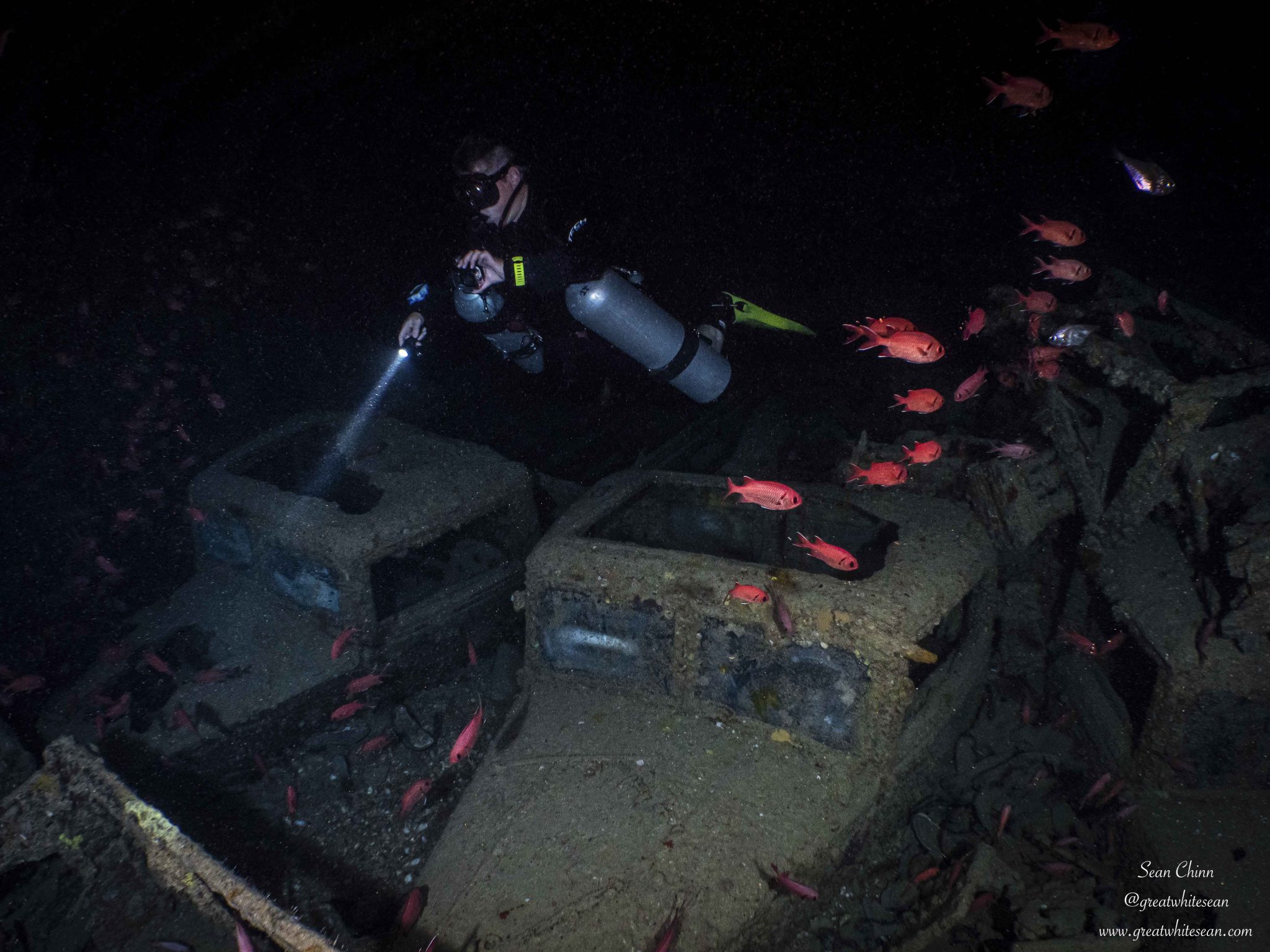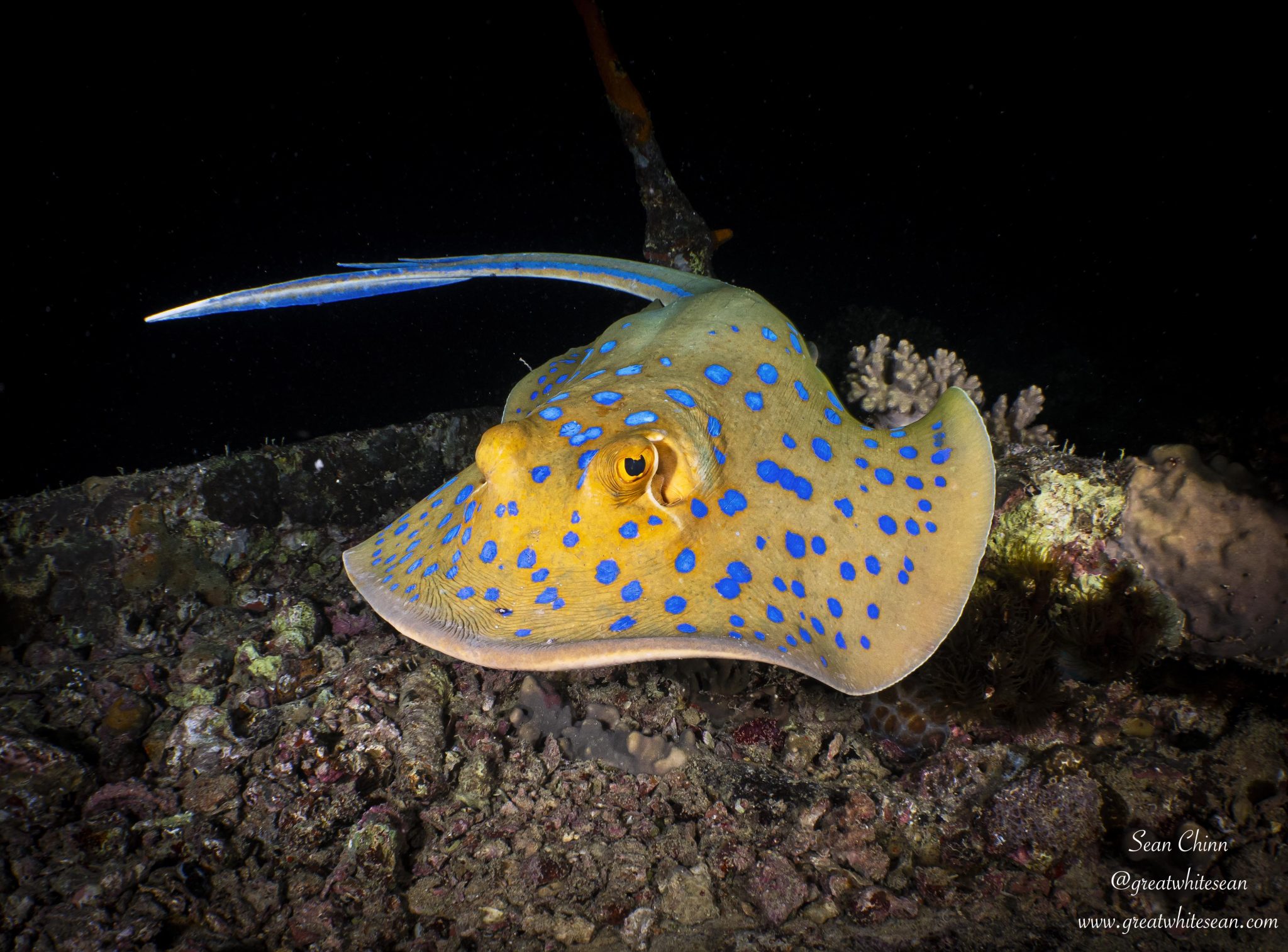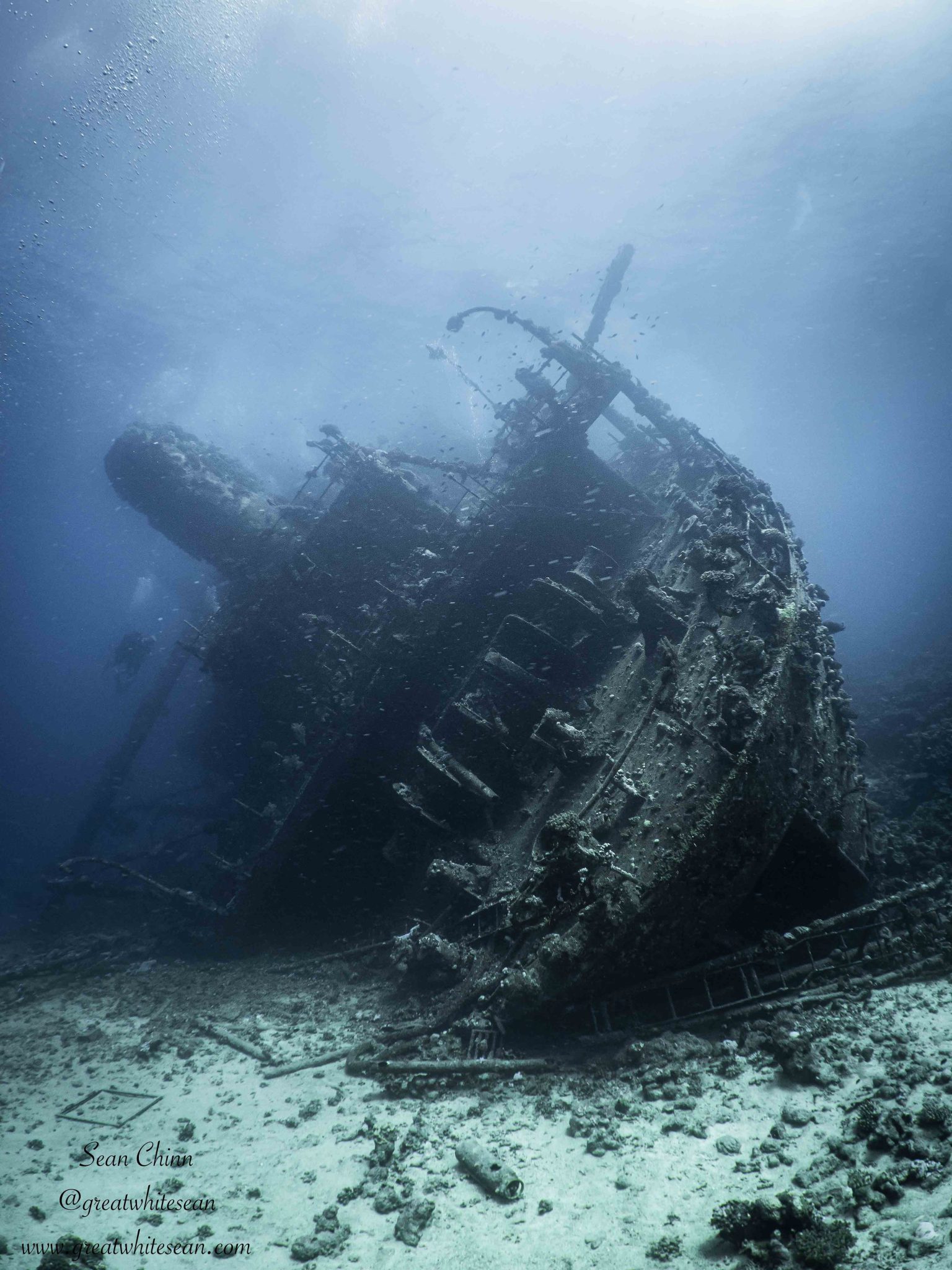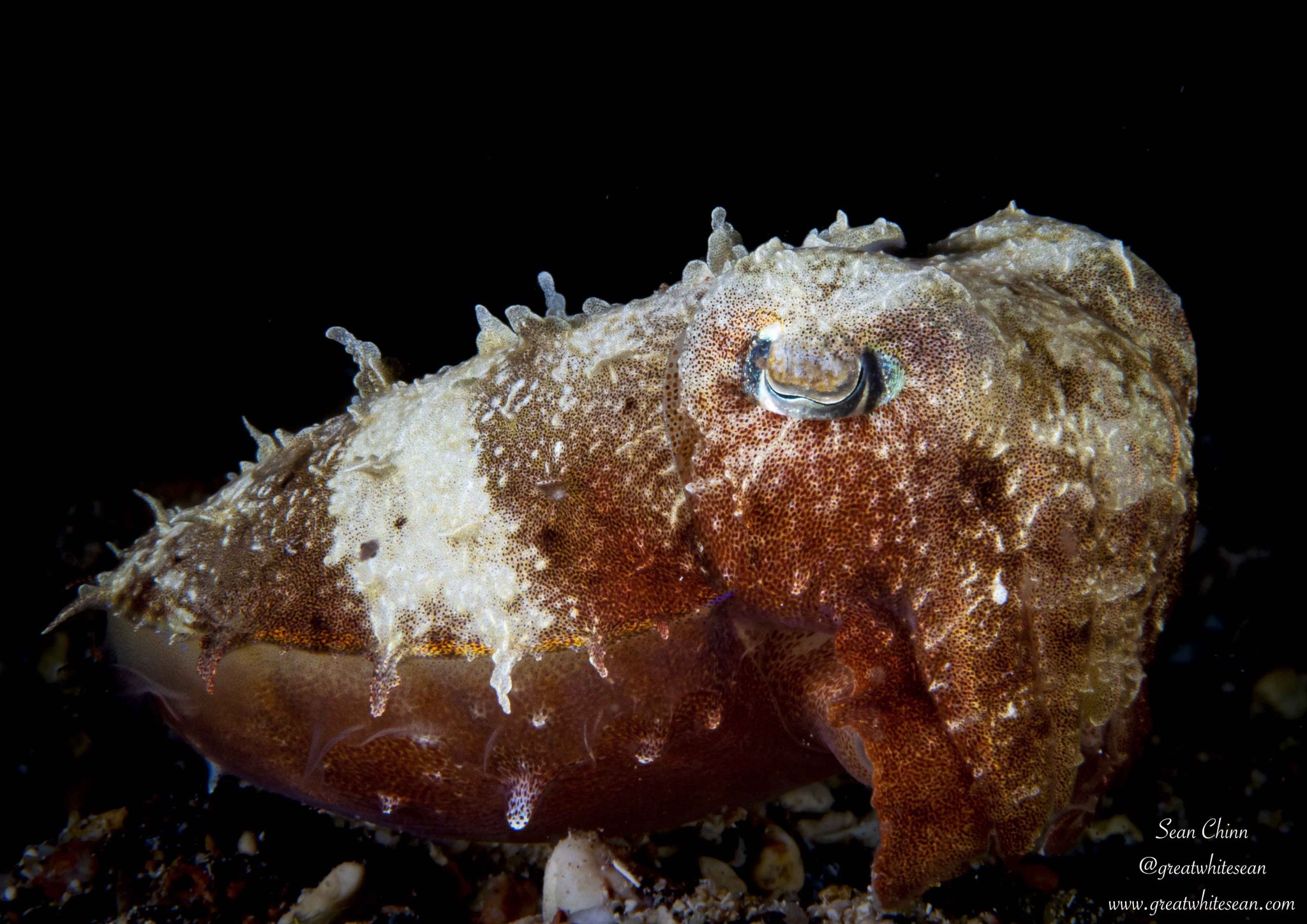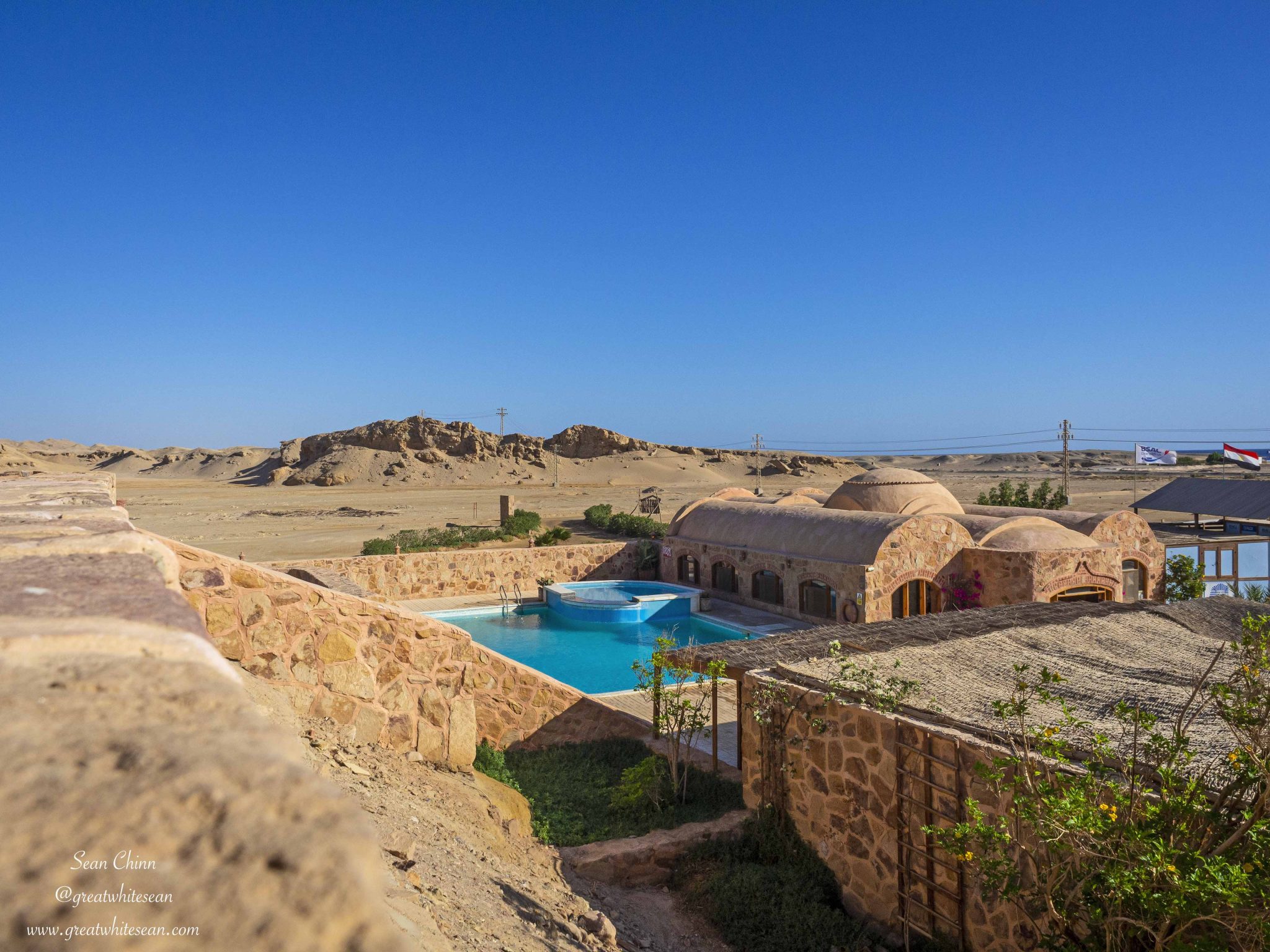News
Into the Blue – Part Two
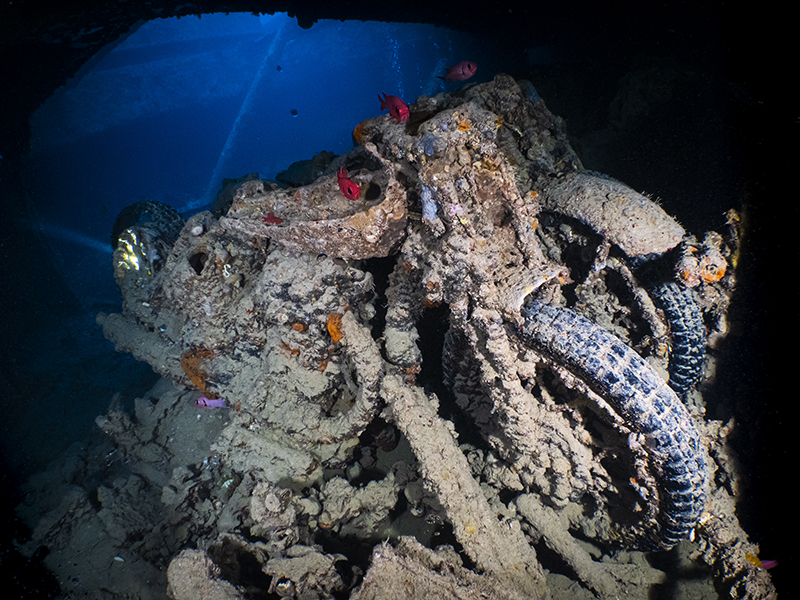
By now, you will have hopefully read the first blog from my recent trip to the Red Sea with The Scuba Place on M/Y Big Blue. If you haven’t, you can find the link to the blog here.
I’ve been diving since 2011, although I didn’t get really serious about diving until 2013. In the November of that year I joined Scuba School on a trip to Sharm El Sheikh to complete my Advanced Open Water course. That was the first time I heard about the famous SS Thistlegorm and its cult status in the wreck diving world. Unfortunately, as I, along with a lot of the group were novice divers, and so we were unable to dive it on that 2013 trip, along with a lot of the other famous wrecks from the North. Little did I know, I wouldn’t return to the Northern Red Sea until this trip in September 2022 with The Scuba Place. The wrecks remained mysterious all those years but I was soon getting the full experience. After the first two and a half days exploring the amazing reefs, it was time to break my Thistlegorm virginity and get the true “lust for rust” experience of the Northern itinerary.
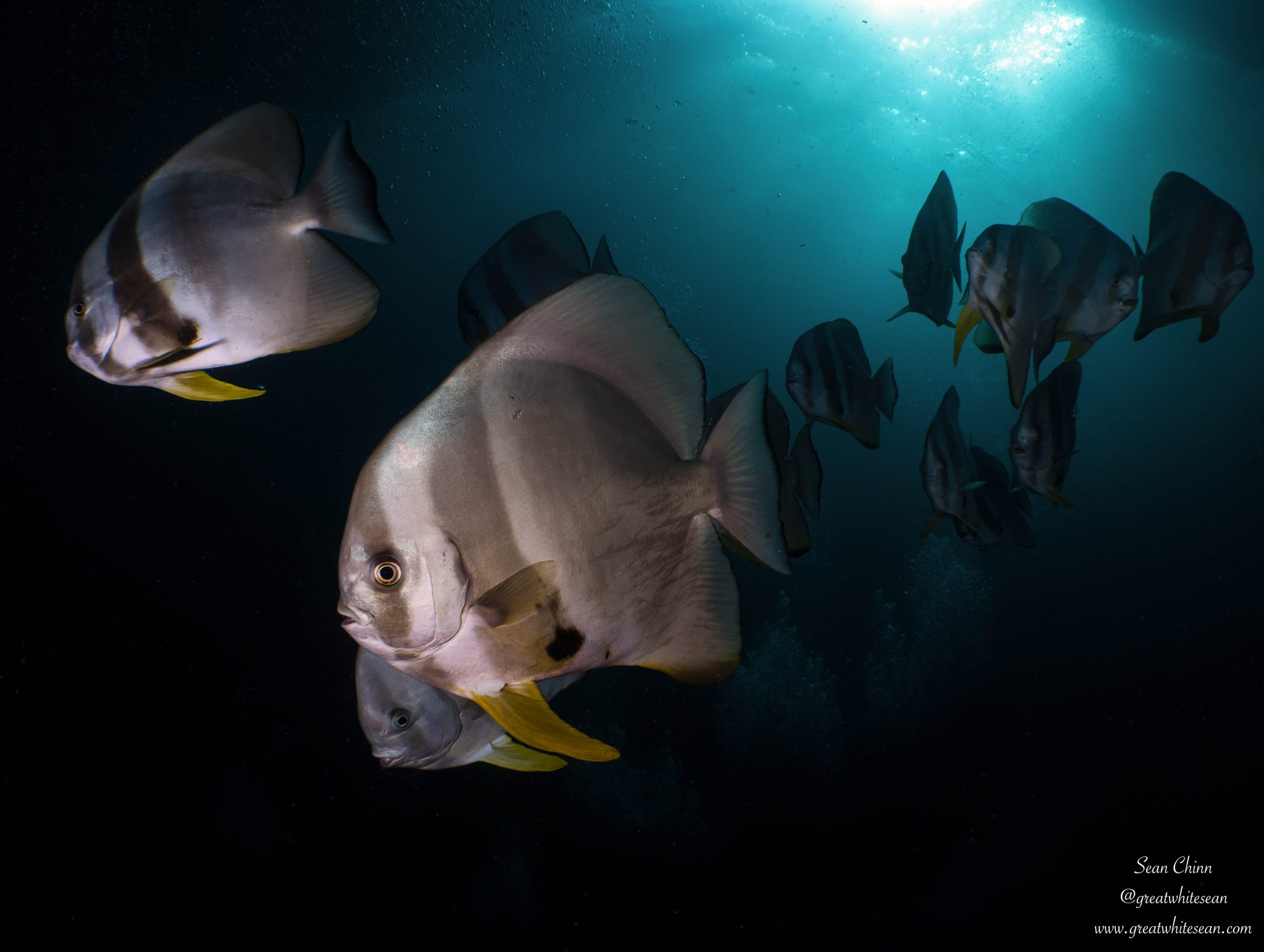
A school of batfish greeted us on our safety stop after an amazing introduction to the SS Thistlegorm.
As we moored up at the SS Thistlegorm for the afternoon dive, I got a strange sense of anticipation run through my body. More so than at any other specific dive site. Strange really, as I don’t normally get excited about wreck diving, but here was a site that I’d heard so much about but was still so mysterious. I’d always thought it was a difficult dive and had a slight fear of it, as I wasn’t allowed to do it all those years back. Then, after watching a 20 minute film explaining the story of the wreck and listening to the stories of survivors,. I knew it was a site that demanded respect. As Mo went through the dive briefing, I quickly realised it seemed a lot more simple than I had in mind. I then became more excited than fearful as me and my dive buddy went through our plan.
There was an eerie feeling as we submerged below the gentle swell. The visibility was a lot more milky compared to the clear blue I was used to in the Red Sea. However, the wreck soon came into view as we dropped down the shot line. The first thing that struck me and in my opinion just made the wreck extra special, was the life on it.
Instantly, crocodile fish and scorpion fish were spotted resting on the wreck, as we made our way to the anti-aircraft gun on the stern. I made a quick visit to take some photos before we turned back and penetrated the wreck for the first time. A surreal experience but the numerous glassfish and lionfish at the entry point kept me entertained before seeing the remnants of yesteryear. The different vehicles that still keep their place in the decks are the main highlight, but it was the boots that struck a chord with me: signs of the human lives that were present on the fateful day the bomb hit. I got a real buzz from my first time on the Thistlegorm, with a school of batfish greeting us on our safety stop finishing off the adventure. John and I ascended from a great dive with a high five, knowing I’d fulfilled a special memory.
I enjoyed three more dives on the Thistlegorm, giving me chance to explore a little more and see a little more life. Some cool nudibranch and a cuttlefish making their home inside the wreck added to the array of life I’d already seen. It was the night dive that truly hit the marine life spot. It really came to life at night and I soon lost count of the amount of scorpionfish I saw. The contrast of the dark and wreck against the blue spotted stingrays made their colours really pop as around six or seven were spotted. Eels, lionfish and crocodilefish making up the rest of the weird and wonderful sights on the wreck at night. Amazing memories from my first time exploring the Thistlegorm that will last forever.
After the two morning dives on the Thistlegorm, we headed off to the Barge wreck site for an afternoon and night dive. It’s not much of a wreck when you compare it to the others on the trip. It lies like a flat platform on the seabed with some sides rising out from the reef providing extra space for coral growth and marine life to enjoy. While it doesn’t provide a real wreck fix with penetration, it is a haven for marine life, littered with all types of hard and soft corals. Look closely and the Barge is a great spot for the weird and wonderful. The numerous nudibranch and grey moray eels provided my macro fix on the night dives, while the occasional buzz from huge hunting giant trevally provided the entertainment. A nice contrast of wrecks before moving on to Abu Nuhas.
Abu Nuhas is a really unique place. Its submerged reef has been bad luck for five passing ships, with five cargo shipwrecks lining its northern slopes. While it was more than unfortunate for some, the wrecks have provided fortune for those looking for a wreck diving haven. Our day consisted of diving three of the wrecks – The Carnatic, Giannis D and Marcus/Chrisoula K in that order.
Going into the trip, it was the Giannis D that I was most keen to dive. I’d always admired the wide angle stern shots I’d seen over the years, with it staying pretty much intact and creating a dramatic image as it lies on its side. It was a fantastic dive with some interesting and easy penetration; I also took some shots of the stern in all its glory. A huge grouper sitting inside the wreck provided the wildlife fix, as it floated with ease looking out into the blue from an opening on the wreck. I think it was the Carnatic that stole the show personally though. Her open windows out to the blue that are covered in soft coral were unique, and glassfish dancing in formation inside mesmerised into a truly memorable dive. The Marcus provided the adventure as penetration was a little more difficult to work my way through the wreck.
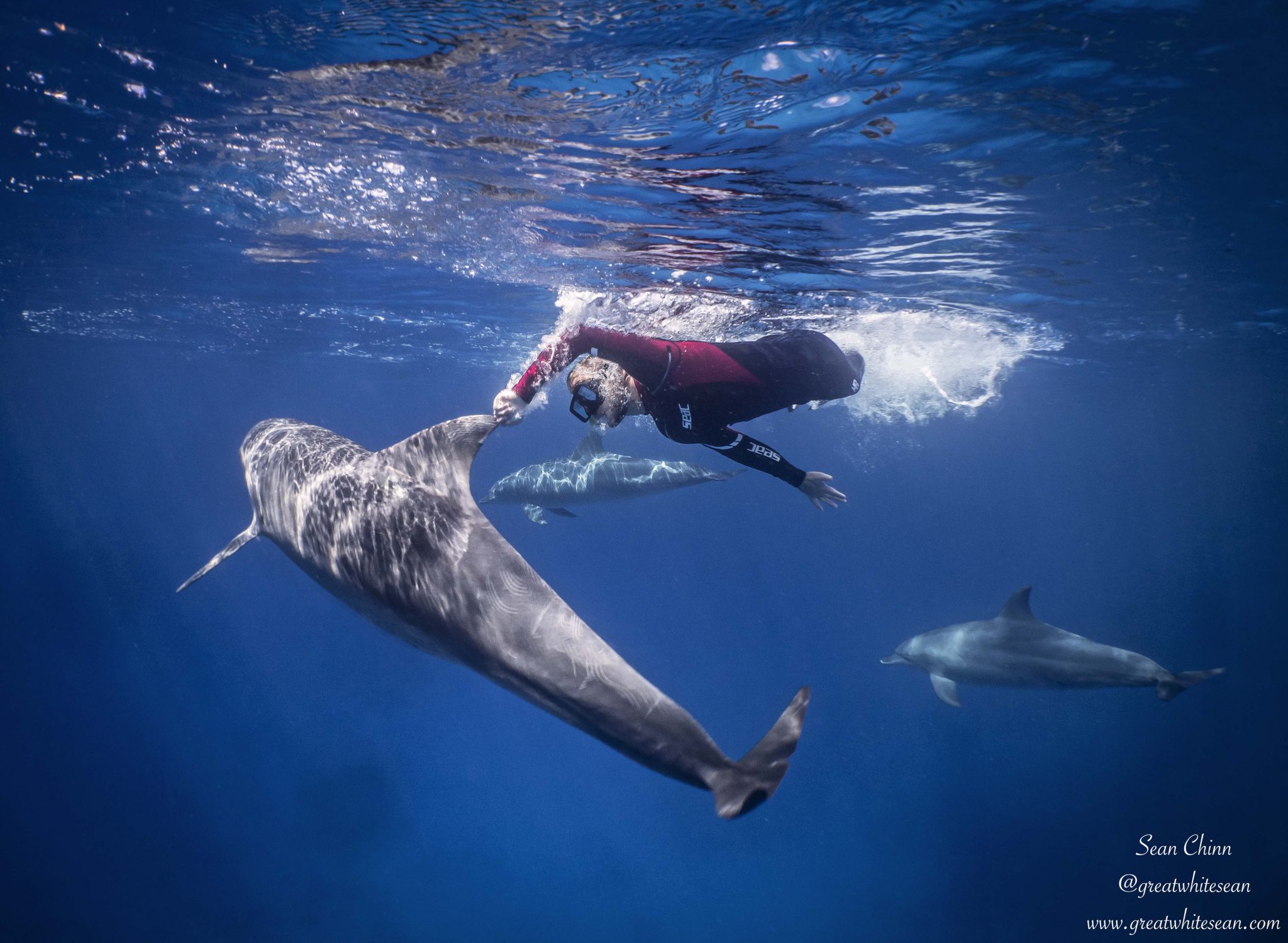
Bottlenose dolphins provided amazing entertainment as they came and played while we snorkelled at the surface.
The day at Abu Nuhas was the best of the trip for me and that wasn’t solely because of the wrecks….. YES!! Once again it was marine life that had me screaming with joy underwater and a buzz through my body like no other. FINALLY!!!!! After 9 years of taking photos underwater, I was able to share the water with dolphins (bottlenose in this instance) and shoot them in all their glory.
Our journey to and from the wrecks on each dive took us through the channel on the ribs, where dolphins were seen on every pass playing in the slight waves. After the second dive, the guides asked if we wanted to try to snorkel with them. It was a resounding yes and as the speedboat whipped up a wave storm, the dolphins headed to the surface to play. I dropped in with no elegance at all, as my excitement took over. I was wondering whether they would stay once we entered, but how they stayed and played was beyond anything I could imagine. Bringing seaweed to us and then, with a flick of their tails, speeding off after teasing with a slow approach. There were nine in total and they even came by to show off the baby of the group. It was definitely up there as one of my greatest moments in the water.
We finished the liveaboard trip with three more amazing reef dives, with the highlight being a small cave full of glassfish and MANY lionfish. I entered to take photos of the glassfish before the lionfish started to sneak out of every crevice and reveal themselves from their camouflaged rest spots.
It got a little hairy but made for a truly interesting moment to finish the week on Big Blue. The fun wasn’t done though, as John eluded to the fact that I was on the same late flight as them on the Saturday and asked if I’d like to join his group for a night at Roots Red Sea. Sounds like a good plan!! Also, if we got there in time, a night dive on the house reef that’s a haven for the weird and wonderful would be on offer. What an amazing surprise end to the trip at an amazing dive resort: secluded, with a beautiful desert backdrop, sitting just metres from the sea. Thankfully, we made it for a night dive and it was as incredible as John said it would be. Reef squid, numerous cuttlefish, a bouncing stonefish jumping over sea moths AND a dwarf lionfish made this one of the best night dives ever, and a perfect end dive to a perfect trip. A final day of relaxation at Roots pool and enjoying the beautiful food finished it in style.
For more information about diving on Big Blue:
News
Book Review: Fire on Monroe Bravo by Fred Lockwood

Fire on Monroe Bravo is the latest book in the Jack Collier series by Fred Lockwood. Our story begins with our lead characters, Jack and Sandro, owners of Marine Salvage & Investigation Company, arriving on the Monroe Bravo Oil & Gas Platform in the North Sea. Having secured a contract for their vessel the MV Stavanger to act as support ship to the platform for TransGlobal Oil, our protagonists are on a celebratory visit.
However almost as soon as they arrive a series of explosions rock the platform, causing huge damage, loss of life and the very real danger of a massive human, ecological and financial disaster.

As the danger mounts for both our heroes and the surviving workers, Jack and Sandro will have to escape the inferno, all while trying to save the platform and the men still trapped unable to help themselves.
The disaster sets the scene for the unfolding story lines following the fate of the platform and our main characters, the police investigation into a suspected terrorist act and the actions of TransGlobal Oil as they attempt to navigate the pubic outcry and financial repercussions.
In his eighth book, Fire on Monroe Bravo, Fred Lockwood delivers an explosive thriller, with plenty of above and in-water drama, and our heroes fighting for survival, what more can you ask for?
We thoroughly recommend this read and look forward to the next in the series. For more information about his book series, you can check out the reviews of his previous books here on Scubaverse.
- Title: Fire On Monroe Bravo
- Author: Fred Lockwood
- ISBN: 979-8325324536
Available in a paperback version and for Kindle from Amazon and book stores.
Blogs
Alonissos: The complete diving destination (Part 1)

In June we were incredibly fortunate to be invited to dive in Alonissos, a small Greek Island in the Sporades island chain located in the North Aegean Sea. While I have long been a big fan of the Greek Islands as a great holiday destination, I had not had the opportunity to do any diving on previous visits and Mike and I were extremely excited to see what Alonissos had to offer both above and below the surface!

The Sporades are easily accessible via the airport in Skiathos (the first island in the chain), which is served by Jet2 flights from all major UK airports from May through October. Numerous ferries and charter boats make island hopping from Skiathos Town a breeze. After an hour boat ride, the picturesque port of Patitiri was a wonderful introduction to Alonissos, where we were met by our gracious hosts Kostas of Albedo Travel and Dias of Alonissos Triton Dive Center. Mike and I were delighted to be staying at the Paradise Hotel, aptly named for its stunning views over the sea and great location for walking to the waterfront.

Alonissos is beautifully situated in the National Marine Park of Alonissos and the Northern Sporades, the largest marine protected area in Europe. The surrounding seas offer fabulous marine life, including incredibly rare species such as the Mediterranean monk seal. They boast deep walls covered in gorgonians and sponges, stunning topography with caverns, swimthroughs and pinnacles, and the first accessible ancient shipwreck from 500BC!

In locations where historical sites have been reported, the waters are largely restricted, but with collaboration between government, underwater archeologists and dive centres, incredible underwater museums are being created for a truly unique diving experience. Alonissos is home to the first of these, the Ancient Shipwreck of Peristera Accessible Underwater Archeological Site. The chance to dive into history (along with reports of healthy reef life and amazing underwater topography) meant Mike and I were keen to get in the water.

Our introduction to the diving around Alonissos was at the Agios Georgios Pinnacles, in the channel between Alonissos and Skopelos. This fantastic site was named “The Chimney,’ and proved to have a huge amount to see. We got to a decent depth here (over 25m), and marvelled at a colourful reef wall with a wonderful swim through whose rocky walls were absolutely covered with life. As well as brilliant topography there was no shortage of macro life here. We saw numerous nudibranchs, five different species in total. The second dive at Mourtias reef nearby was a shallower dive along a nice wall with lots of crevices. Several moray eels and grouper called this site home. We enjoyed looking in the crevices for lobster and smaller benthic life, such as cup corals and tunicates.

Our itinerary allowed us two dives a day with afternoons left to explore the island with our hire car and evenings to enjoy the famous Greek hospitality. This proved to be a lovely mix of in-water and land based diversions.

The next days diving to the Gorgonian Gardens and Triton’s Cave was to be even better! These two stunning sites are nothing short of fabulous. The Gorgonian Gardens was a deep wall near to the Agios Georgios islands. The ever-present currents in this deep channel meant that the sea life was amazing … the namesake Gorgonian sea fans dotted the wall at a depth of 30 to 50 meters, getting ever larger the deeper we went. Above 30m was by no means less beautiful, with sponges, corals, scorpionfish, moray eels and some rare and colourful nudibranchs.

The second shallower dive of the day was to Triton’s Cave or the Cavern of Skopelos, on the east side of that island. The spectacular rock formations had wild striations both above and below the water making a truly epic topography. The cavern entrance was at 14m, and big enough for a buddy pair, winding up to 6m and passing two beautiful windows out into the blue. Emerging from the cavern, the light at the shallower depths and the incredible rock formations made for a fantastic gentle swimming safety stop and we all surfaced by the boat with massive grins.

Check out our next blog :Alonissos: The complete diving destination (Part 2)” to hear about our amazing dive on the 2500 year old Peristera Wreck!
Thanks to:
Alonissos Triton Dive Center https://bestdivingingreece.com/
Albedo Travel https://alonissosholidays.com/activities/
Paradise Hotel https://paradise-hotel.gr/
Alonissos Municipality https://alonissos.gr/en/
-

 Blogs2 months ago
Blogs2 months agoDiving With… Nico, Ocean Earth Travels, Indonesia
-

 News1 month ago
News1 month agoMurex Bangka Announce New Oceanfront Cottages & Beachfront Dining
-

 Blogs2 months ago
Blogs2 months agoA new idea in freediving from RAID
-

 Marine Life & Conservation1 month ago
Marine Life & Conservation1 month agoIceland issue millionaire whale hunter a licence to murder 128 vulnerable fin whales
-

 Marine Life & Conservation2 months ago
Marine Life & Conservation2 months agoThe Shark Trust Great Shark Snapshot is back
-

 News3 months ago
News3 months agoCharting New Waters; NovoScuba Goes Global with the Launch of their Revolutionary Dive Training Agency!
-

 Gear News1 month ago
Gear News1 month agoNew Suunto Ocean – a dive computer and GPS sports watch in one for adventures below and above the surface
-

 Marine Life & Conservation Blogs2 months ago
Marine Life & Conservation Blogs2 months agoBook Review: Plankton


